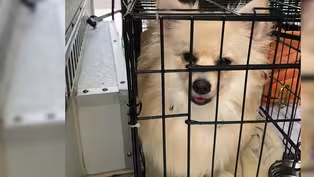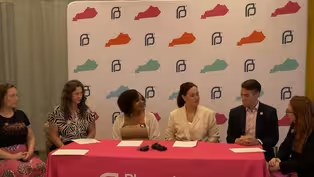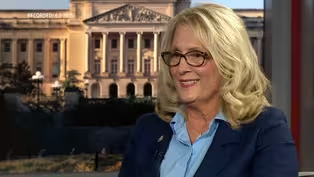
Floyd County Couple Working to Make a Difference
Clip: Season 3 Episode 264 | 9m 3sVideo has Closed Captions
John and Jean Rosenberg have called Floyd County home for more than 50 years.
John and Jean Rosenberg are challenging the idea of aging. The two arrived in Floyd County more than 50 years ago, drawn by the opportunity to make a difference. They've carved out a place in Eastern Kentucky's history with their almost tireless efforts to improve the lives of those living in the region.
Problems playing video? | Closed Captioning Feedback
Problems playing video? | Closed Captioning Feedback
Kentucky Edition is a local public television program presented by KET

Floyd County Couple Working to Make a Difference
Clip: Season 3 Episode 264 | 9m 3sVideo has Closed Captions
John and Jean Rosenberg are challenging the idea of aging. The two arrived in Floyd County more than 50 years ago, drawn by the opportunity to make a difference. They've carved out a place in Eastern Kentucky's history with their almost tireless efforts to improve the lives of those living in the region.
Problems playing video? | Closed Captioning Feedback
How to Watch Kentucky Edition
Kentucky Edition is available to stream on pbs.org and the free PBS App, available on iPhone, Apple TV, Android TV, Android smartphones, Amazon Fire TV, Amazon Fire Tablet, Roku, Samsung Smart TV, and Vizio.
Providing Support for PBS.org
Learn Moreabout PBS online sponsorshipLast year, we launched an initiative called The Next Chapter, focusing on the rewards and challenges of growing older.
As part of that initiative, we're bringing you a segment occasionally that we call Thrivers, a celebration of older Kentuckians who are challenging the idea of aging and retirement and their next season of life.
You can call it retirement instead of retirement.
And that's like 93 year old Don Rosenberg and his wife, 81 year old Jean Rosenberg.
The two arrived in Floyd County more than 50 years ago.
Drawn by the opportunity to make a difference over the last five decades.
It's unlikely you will find anyone in the city of Prestonsburg who doesn't know John and Jean Rosenberg, or hasn't been impacted directly or indirectly by the work they've done in the community.
Married for 58 years, theirs is a partnership centered around serving others.
We've been very fortunate that our values are part of our relationship.
I'm Jewish.
Change, Quaker Judaism.
Asks you to try to do what you can to repair the world.
But that's justice.
And taking care of the orphan and the stranger and the people who are around you.
But, that's that's part of your life.
And so I don't know that it's anything extraordinary.
You're trying to build the world you want to live in, and you get engaged in community activities.
And being married to John Rosenberg has never.
I never have to worry that there would be something to do with the next day.
For John, a life dedicated to helping others was shaped by two experiences.
The first as a child in Germany, where he and his parents were taken by Nazis from their home to a courtyard, forced to watch scriptures burn and a synagogue blow up after spending a year in an internment camp.
The family fled to the U.S. our family, or my father and mother valued so much coming to this country that we were able to be here and to find a home in North Carolina.
And then, you know, then that whatever opportunities we had to make life better for our neighbors and the communities where we happened to be living.
John also served his country as an officer in the U.S. Air Force.
He says it was on a trip home from England with another officer who was black.
That would eventually set him on the path to become a civil rights lawyer.
When we got to Washington, D.C., he said that he would see me again when we got to England.
And I said, where are you going?
And he said, well, I've got to go to the back of the train where the blacks sit.
And, and it was a very impactful incident, I think, in my life.
I think it in a major way helped me realize that when I go into law school that, I wanted to try to work in the civil Rights division.
And so eventually I was able to do that and get a job.
In 1962.
Jane came in 1965.
John and Jane worked together on cases involving voting rights and the enforcement of the Voting Rights Act of 1965.
And we worked very long hours, and we it was it was not easy.
And, you get to know a person.
And I enjoyed being with John.
He could always make a situation.
He could always make me laugh.
And I look forward to telling him my what was going on in my world.
And it just got closer and closer, and it was very it seemed very natural.
I mean, I'm not far on weekends tonight, right?
He had he was one of the few fellows I knew who had food in the refrigerator.
The two married and in 1970 left the Civil Rights Division.
Our son Michael was born in 1970, the beginning of 70.
And then the Nixon administration came in, and we looked like they were going to back off on school desegregation.
So we decided pretty much to leave the division in the summer and to go on a big camping trip.
During the trip, John got a call from a former Department of Justice colleague that would take their lives in a new direction to a community they would end up calling home.
Preston Burke and my friend Terry Lindner said, why don't you stop in Charleston and and they need someone to run this legal services program on a new directory in Kentucky.
John opened the Appalachian Research and Defense Fund, known as Apple Red.
Offering free legal services to low income people in the region.
John said it took a while for the community to accept him.
And so when we moved in first started, this organization, there was a lot of animosity, so it was hard.
But over time, people saw that what we wanted to do was help.
Apple Red has operated for more than 55 years, expanding to 37 counties and helping thousands.
John retired from the organization in 2001 at the age of 70.
I think that was really the the mark that I looked at was I was still I mean, I enjoyed what I was doing, but it seemed like a good time to stop and have them bring in somebody else who was new.
But another offer kept him working after retirement.
I always felt very proud to be a lawyer in Kentucky.
I enjoyed practicing law.
I thought it was important.
And to do that, and one of my colleagues here was interested in having me work with them part time on environmental and elderly work, and so I could keep doing legal work as long as I wanted to do it.
And I had two other apple red lawyers, and we started in a small office in Prestonsburg first year, and we called it the Appalachian Citizen's Law Center.
Gene Rosenberg has also found several opportunities to serve the community.
She founded the Floyd County Meals on Wheels program, started a program to support single mothers attending the big Sandy Community and Technical College, and was instrumental in getting a smoke free ordinance passed in Prestonsburg.
She also established childbirth preparation classes, the result of which the Rosenbergs say they still see today.
When we started this nonprofit called the big Sandy Family Childbirth and Childbirth Education Association, only a lawyer would come up with that name.
So then we had these annual get togethers of their parents.
And today, when I go with Jane, when we're shopping, somebody to say, hey, Gene, look, remember that little baby?
Remember where you taught us as a six foot six guys getting groceries off the shelf 20 years, 30 years later?
Earlier this year, the same community that was once unsure about them honored them for their contribution by naming a new town square after them.
It was a very lovely gesture.
I mean, I'm surprised, but it was a lovely thought.
And they these three women and the way they decorated it and what they did, and now that it's a nice place for families to bring their children and play with those big chess pieces and that sort of thing.
As for legacy, I think I would like my legacy to be a sense of encouraging people to have a sense of community in many forms.
And they have a group called the Rosenberg Circle, which we did invent.
But, I mean, I think it's a wonderful idea.
The idea of keeping that organization going as providing legal services to the poor.
I think justice is important.
Justice across the board.
They are tremendous couple indeed.
John and Jane have received numerous awards for their community work, as you can imagine.
One of the projects they say they are most proud of.
The East Kentucky Science Center and Planetarium in Prestonsburg, which the two of them helped found.
The center serves as a hub of Stem education in eastern Kentucky.
Now, for more information about how we can thrive as we age and all the aging resources we have, log on our website at KETV.
Org slash the next chapter.
There you'll find a variety of aging related topics and other helpful resources.
So check it out.
Group Reuniting Animals with Tornado Victims
Video has Closed Captions
Clip: S3 Ep264 | 3m 53s | The group is reuniting animals that were lost during the storms and helping support pet owners. (3m 53s)
KY Democrats Talk About Medicaid Cuts
Video has Closed Captions
Clip: S3 Ep264 | 3m 11s | Kentucky Democrats are highlighting the impacts of the so-called 'big, beautiful bill." (3m 11s)
Sen. Webb Defends Switching Political Parties
Video has Closed Captions
Clip: S3 Ep264 | 7m 51s | She's offering a defense to those who claim she's betrayed her supporters. (7m 51s)
Providing Support for PBS.org
Learn Moreabout PBS online sponsorship
- News and Public Affairs

Top journalists deliver compelling original analysis of the hour's headlines.

- News and Public Affairs

FRONTLINE is investigative journalism that questions, explains and changes our world.












Support for PBS provided by:
Kentucky Edition is a local public television program presented by KET


